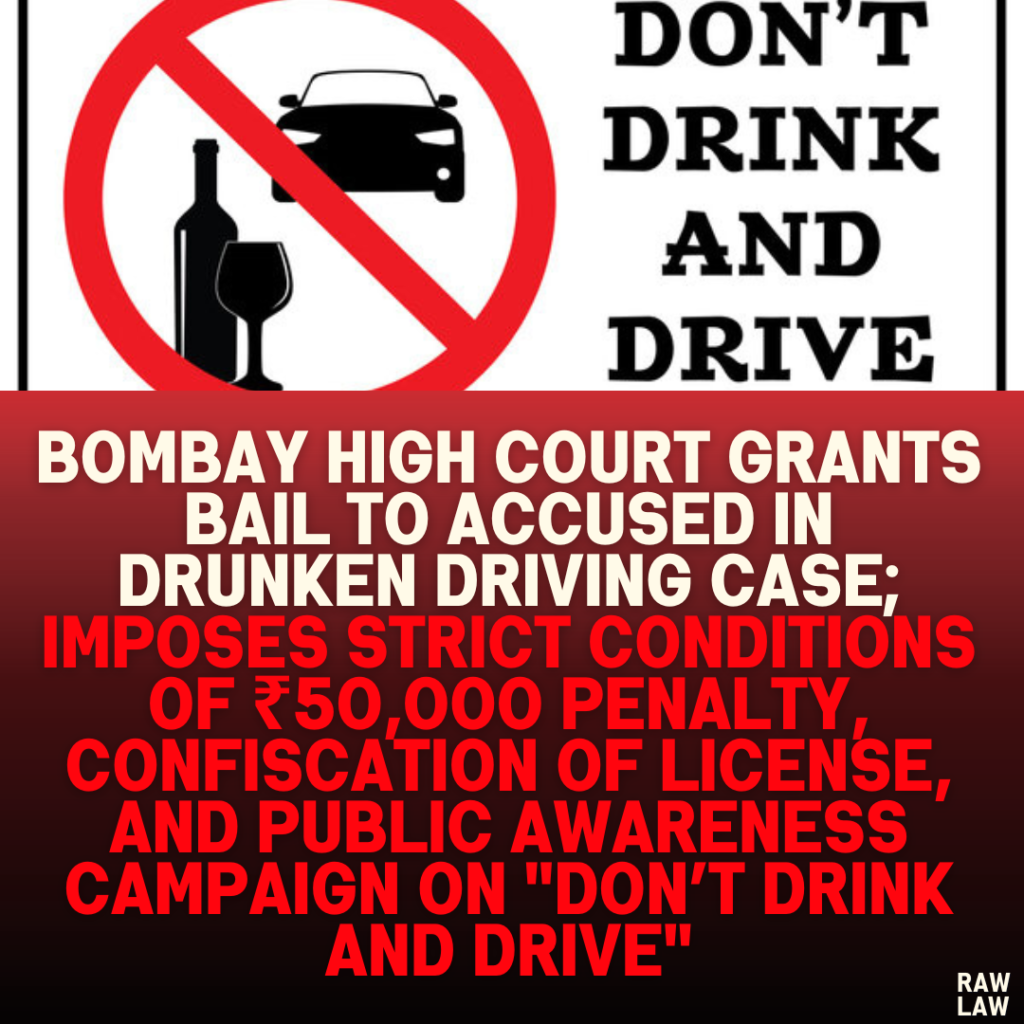Court’s Decision:
The Bombay High Court granted bail to the applicant on the following conditions:
- Furnishing a bond of ₹1,00,000 with one or two sureties of like amount or provisional cash bail of ₹1,00,000.
- Depositing ₹50,000 in the Police Welfare Fund as compensation for damaging public property.
- Undertaking community service to raise awareness about the dangers of drinking and driving.
- Surrendering his driving license until all conditions are fulfilled.
- Cooperating fully with the ongoing investigation and appearing at all court proceedings unless exempted.
The court clarified that these conditions aim to balance public safety with the rehabilitation of the applicant.
Facts:
On November 28, 2024, the applicant, driving under the influence of alcohol (42.5% blood alcohol level), was involved in reckless driving incidents:
- He disobeyed police barricades at two checkpoints in Mumbai and damaged public property.
- He allegedly caused minor damage to other vehicles while attempting to evade police at Gokhale Bridge and Mahakali Road.
- After being accosted, the applicant was arrested, and an FIR was registered under Sections 110, 132, 281, and 324(4) of the Bharatiya Nyaya Sanhita (BNS), 2023, along with Section 185 of the Motor Vehicles Act, 1988.
Issues:
- Grant of Bail: Whether the applicant should be released on bail despite the serious allegations of drunken and negligent driving.
- Imposition of Conditions: Whether the additional conditions, such as community service and monetary penalties, are necessary and justified.
Petitioner’s Arguments:
The petitioner made the following arguments:
- Disproportionate Charges: The petitioner contended that all charges, except for one under Section 110 of the BNS, are bailable. He argued that Section 110 (serious crime) was unjustly invoked to frame him.
- Career and Reputation: The applicant is a highly educated professional, holding an MBA from IIM Lucknow and working as a Senior Vice President at a reputed NBFC. Continued incarceration would damage his career and personal prospects.
- Lack of Grave Harm: The petitioner claimed that the allegations were exaggerated, and at most, he should face charges for rash and negligent driving.
Respondent’s Arguments:
The prosecution opposed the bail application, arguing:
- Endangerment: The applicant’s actions endangered public safety by driving in an inebriated condition, flouting police orders, and damaging public property.
- Seriousness of the Offense: The offense is grave as the applicant repeatedly evaded police checkpoints, damaged vehicles, and put the lives of others at risk.
- Accountability: The prosecution emphasized the need for strict conditions to deter similar behavior and ensure accountability for the applicant’s actions.
Analysis of the Law:
- Bharatiya Nyaya Sanhita (BNS), 2023: The applicant faced charges under Sections 110, 132, and 281 of the BNS. These sections deal with offenses like disobedience of public servants, negligent conduct, and damaging public property.
- Motor Vehicles Act, 1988: Section 185 penalizes drunken driving, a serious offense under the act.
- Principle of Bail: The court weighed the applicant’s right to liberty against the need to protect public safety and ensure adherence to the law.
Precedent Analysis:
The court referred to the case of Parvez Jilani Shaikh and Anr. vs. State of Maharashtra and Anr., which emphasized imposing rehabilitative measures, such as community service, as conditions for bail. This precedent reinforced the idea that bail conditions should serve as deterrence and rehabilitation rather than mere punishment.
Court’s Reasoning:
The court made the following observations:
- Applicant’s Background: The applicant’s young age, educational qualifications, and professional achievements were considered mitigating factors.
- Seriousness of Offense: The applicant’s actions—disobeying police barricades, driving under the influence, and damaging public property—were deemed grave. The court noted that public safety was jeopardized, necessitating strict bail conditions.
- Imposition of Conditions: The court justified the additional conditions (community service and penalty) as necessary for balancing rehabilitation with public deterrence. The community service was intended to raise awareness about the risks of drunken driving.
Conclusion:
The court allowed the bail application with strict conditions:
- Monetary Conditions: The applicant must furnish a ₹1,00,000 bond and deposit ₹50,000 in the Police Welfare Fund.
- Community Service: For three months, the applicant must conduct public awareness campaigns by holding banners that read “Don’t Drink and Drive” at a visible location near his residence.
- Compliance Reports: The local traffic police officer will oversee the community service and submit a compliance report to the court.
- Driving Restrictions: The applicant’s driving license will remain confiscated until all conditions are fulfilled.
- Cooperation: The applicant must attend court proceedings, cooperate with investigations, and refrain from influencing witnesses.
Implications:
- Public Deterrence: This judgment underscores the court’s commitment to deterring drunken driving through rehabilitative measures.
- Awareness Campaigns: The imposition of community service sets a precedent for using bail conditions as a tool for public education.
- Balancing Liberty and Public Safety: The court struck a balance between granting bail and ensuring that public safety concerns are addressed.
